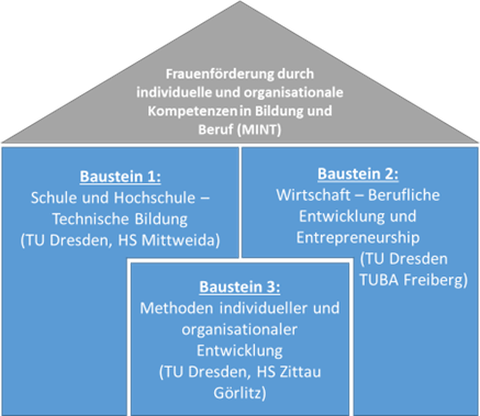Research approach
Research approach:
Module 1:
Survey of the existing data pool, acquisition of cooperation partners, development of a measuring tool
We aim to extract the relevant aspects from existing literature on the influences of subject culture and didactic settings in (early) STEM education on self-efficacy expectations, individual interest and the career choice behavior of girls and women. From these findings, corresponding target groups will be specified (e.g. pupils, teachers, students, lecturers or researchers). Subsequently, various cooperation partners will be acquired for empirical studies. A new, quantitatively evaluable survey instrument will be operationalized for the study of subject cultures. Existing valid and well-evaluated instruments, which will first be collected, tested and adjusted to the research objective.
Module 2:
Establishment of a cooperation structure, cooperations with companies, document analysis, expert interviews
At the beginning of the research period, a cooperation structure will be established across the different participating universities. Then, a literature search will be conducted, to evaluate current research findings and data pools. Extensive cooperation with companies is a goal of the research group. In order to make female achievements visible, a document analysis will be conducted that focuses on both, universities and companies. In addition, female founders will be interviewed in order to identify specific challenges and needs of women, which will be compared with those of male founders. Existing support systems for female founders will be evaluated.
Module 3:
Specification of research questions, examination of instruments for academic support, collecting best practice examples, development of models, comparison in workshops
First, the research questions will be specified. Popular tools such as mentoring and coaching will be applied to the target groups and tested in various real-life contexts. As a result, target group-specific best practice examples will be collected and presented. The process follows the soft systems method, which is first designed and then implemented step by step. After an extensive system analysis, models of the relevant systems will be developed, and subsequently compared to real-life conditions in workshops to derive suggestions for intervention.
Project duration:
01.01.2023 to 31.12.2024
Funding:
Funding is provided by the Sächsische Aufbaubank – Förderbank – (SAB) and is co-founded by the European Social Fund (ESF). The junior research group FioKo is an ESF Plus project.



